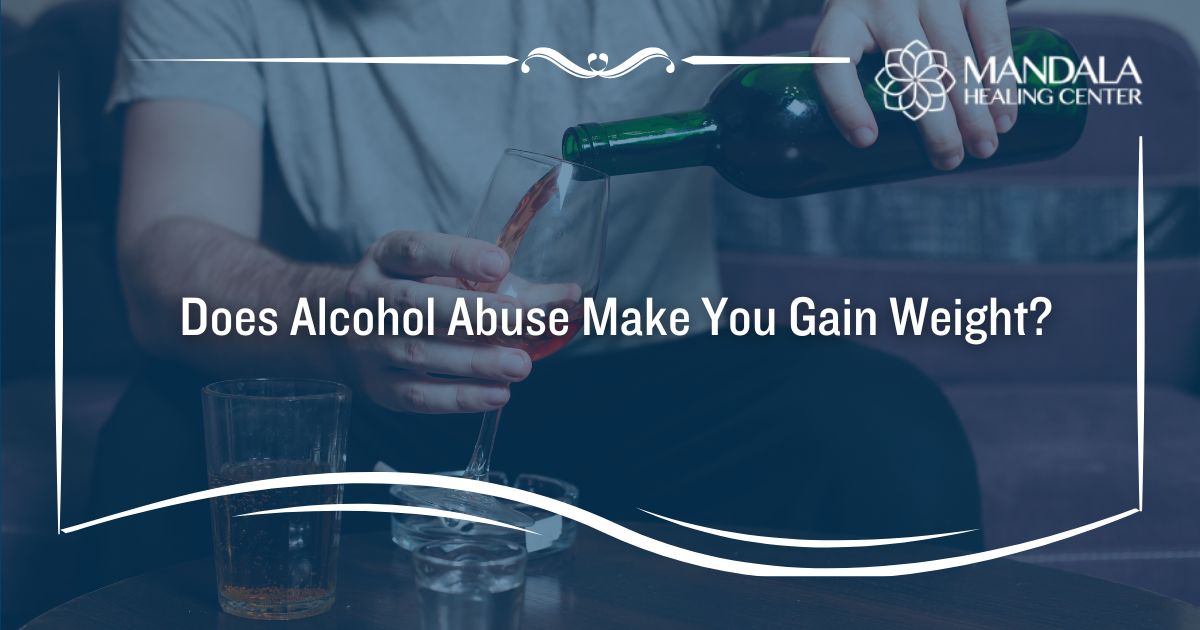Alcohol is a go-to for social gatherings, celebrations, and relaxation for many individuals. However, when alcohol consumption becomes excessive or uncontrolled, it can lead to addiction and other health problems.
One of the most common health problems associated with alcohol abuse is weight gain. So, it’s important to understand the relationship between alcohol and weight gain, the effects of alcohol on weight, and tools for those who may be struggling.
The Effects of Alcohol on Weight
Weight Gain
One of the most common side effects of alcohol consumption is its impact on weight gain. Alcohol is lacking essential nutrients but has a high-calorie count. So, when you drink alcohol, you’re consuming calories without any nutritional value, resulting in weight gain.
Alcohol consumption has also been known to affect metabolism and interfere with the body’s fat-burning capabilities, leading to fat storage primarily around the abdomen, known as belly fat or ‘beer belly.’ This can lead to several health problems, including heart disease, high blood pressure, and type 2 diabetes.
Additionally, frequent and prolonged alcohol consumption can stimulate appetite and facilitate food cravings. Individuals who have been consuming alcohol are more likely to consume high-calorie foods, contributing to weight gain.
Weight Loss
While weight gain is a common side effect of alcohol abuse, weight loss can also occur. Alcohol can suppress appetite, leading to decreased food intake. So, consuming large amounts of alcohol instead of eating regular meals may result in losing weight over time.
Heavy alcohol consumption can also interfere with the body’s ability to absorb essential nutrients, leading to nutritional deficiencies, which may contribute to weight loss and other health problems.
Calories and Alcohol
Alcohol is very caloric-dense, containing approximately seven calories per gram. For comparison, fat contains nine calories per gram, while carbohydrates and protein contain four calories per gram.
Despite its high-calorie content, alcohol does not provide the same nutritional value as other macronutrients, leading to increased calorie consumption without feelings of fullness. Alcoholic drinks, such as mixed drinks, include additional calories from sugars, mixers, and flavorings, further contributing to caloric intake—with some including over 100 calories for just one drink, further increasing the potential for weight gain.
How Much Alcohol Leads to Weight Gain?
While the relationship between alcohol and weight gain is influenced by various factors, including individual differences, drinking patterns, diet, and lifestyle habits, research suggests that light-to-moderate alcohol intake has no direct correlation with weight gain. While heavy drinking contributes to weight gain over time.
Heavy drinking is characterized by the National Institute on Alcohol Abuse and Alcoholism (NIAAA) as consuming four or more drinks on any day or eight or more per week for women, and five or more drinks on any day or 15 or more per week for men.
Signs of Alcohol Abuse
If you or someone you know is showing signs of alcohol abuse, seeking help from a healthcare professional, addiction specialist, or support group can provide guidance, resources, and support for recovery. Common signs of alcohol abuse include:
- Increased tolerance
- Withdrawal symptoms
- Engaging in risky behaviors
- Neglecting responsibilities
- Trouble maintaining relationships
- Physical health problems, such as liver disease, heart problems, or stomach issues
- Mental health disorders, such as anxiety and depression
- Social isolation
- Blackouts or memory loss
Common Factors of Alcohol and Weight Gain
Several factors are associated with alcohol and weight gain, including:
Quantity and Frequency
Excessive or frequent drinking is more likely to lead to weight gain than moderate or occasional consumption.
Type of Alcohol
Different types of alcoholic beverages vary in caloric content and nutritional composition. Cocktails high in sugar, beers, and sweetened wines tend to be higher in calories than distilled spirits or dry wines, increasing the risk of weight gain.
Eating Habits
Frequent and excessive alcohol consumption can disrupt normal eating patterns and lead to late-night snacking or unhealthy food choices, increasing overall calorie intake and contributing to weight gain over time.
Sleep Quality
Excess alcohol use is linked to poor sleep quality, which may lead to weight gain over time due to sleep deprivation and insomnia.
Individual Differences
Genetics, metabolism, age, gender, and lifestyle habits influence how alcohol affects weight in different individuals.
Finding Balance
Balancing alcohol consumption with weight management is possible with the right tools. Here are some mindfulness practices to consider:
Eat First
Eating a balanced meal before drinking will help slow down alcohol absorption while also keeping you full and satiated.
Learn Your Limits
Avoid over-consumption by limiting yourself to no more than 1-2 drinks per day. .
Count Your Calories
Choose lower-calorie drinks such as light beers, seltzers, or spirits with low-calorie mixers to avoid excessive calorie and sugar intake.
Find Alcoholism Treatment Now
Weight gain is just one of the many side effects associated with alcohol abuse. Ultimately, finding a balance between enjoyment and health is key. By understanding the relationship between alcohol consumption and weight gain and implementing strategies to mitigate potential risks, individuals can make healthier choices that support their overall well-being.
If you or someone you know may be suffering from alcohol abuse, we are here to help. Our team of specialists at Mandala Healing Center facilitates healing by combining evidence-based practices and holistic therapies for fully immersive, compassionate care. Contact us today and get started on your journey to recovery.












